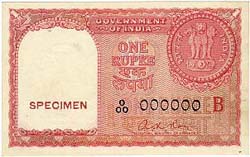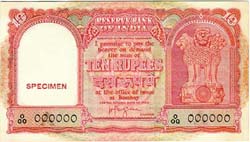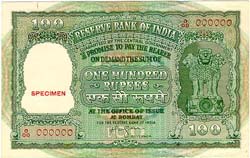|
The Indian Rupee and consequently the paper money issues traditionally enjoyed wide
currency in the Persian Gulf. On presentation by banks in these areas to the Reserve
Bank, these notes were redeemable in foreign currency equivalent.
On achieving independence, India started of with a comfortable foreign exchange
position. The quest for development and the demands of 'catching up' laid considerable
stress on the foreign exchange position. The scarcity situation that ensued led
to possibilities of exploiting the traditional currency arrangements with the Gulf.
To obviate or at least mitigate malpractices, which such an arrangement could give
rise to, a separate series of notes exclusively for circulation in the Gulf (Kuwait,
Bahrain, Qatar, and the Trucial States (now the UAE) were issued by the Indian Government
and the Reserve Bank of India in the 1950's. The notes retained the contemporary
design but were different in colour and carried the prefix 'Z'. The notes were issued
in the denominations of Rupee One, Rupees Ten and Hundred and were redeemable only
at the Bombay office of issue. As the Gulf States issued their own currency, these
notes were withdrawn over a period of time from the early 1960's and ceased to be
used around 1970.



|